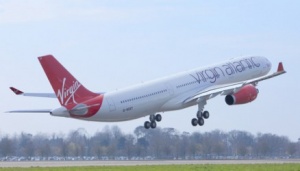Virgin Atlantic links with LanzaTech for aviation fuel trials

Virgin Atlantic has announced the development of a world-first low carbon aviation fuel with just half the carbon footprint of the standard fossil fuel alternative.
According to the carrier, the partnership with LanzaTech represents a “breakthrough in aviation fuel technology” that will see waste gases from industrial steel production being captured, fermented and chemically converted using Swedish Biofuels technology for use as a jet fuel.
The fuel production process recycles waste gases that would otherwise be burnt into the atmosphere as carbon dioxide.
Within two to three years Virgin Atlantic plans flights with the new fuel on its routes from Shanghai and Delhi to London Heathrow as LanzaTech and partners develop facilities in China and India.
The technology is currently being piloted in New Zealand, a larger demonstration facility will be commissioned in Shanghai this year, and the first commercial operation will be in place in China by 2014.
Following successful implementation, a wider roll-out could include operations in the UK and the rest of the world.
LanzaTech estimates that its process can apply to 65 per cent of global steel mills, allowing the fuel to be rolled out for worldwide commercial use.
The energy company believes that this process can also apply to metals processing and chemical industries, growing its potential considerably further.
Speaking as he announced the partnership today, Virgin Atlantic president, Richard Branson, said: “We were the first commercial airline to test a bio-fuel flight and we continue to lead the airline industry as the pioneer of sustainable aviation.
“This partnership to produce a next generation, low-carbon aviation fuel is a major step towards radically reducing our carbon footprint, and we are excited about the savings that this technology could help us achieve.
“With oil running out, it is important that new fuel solutions are sustainable, and with the steel industry alone able to deliver over 15 billion gallons of jet fuel annually, the potential is very exciting.
“This new technology is scalable, sustainable and can be commercially produced at a cost comparable to conventional jet fuel.”
Earlier this week Branson called for a greater focus on green energy, calling on government to provide additional incentives to support the adoption of alternative fuel sources.
Virgin Atlantic will be the first airline to use this fuel and will work with LanzaTech, Boeing and Swedish Biofuels towards achieving the technical approval required for using new fuel types in commercial aircraft.
A ‘demo’ flight with the new fuel is planned in 12-18 months.
Jennifer Holmgren, chief executive of LanzaTech, said: “This technology will enable airlines to dramatically reduce their carbon footprint by reusing gases that would otherwise have been emitted directly into the atmosphere.
“It promotes sustainable industrial growth, as the process enables manufacturing plants to recycle their waste carbon emissions.”

